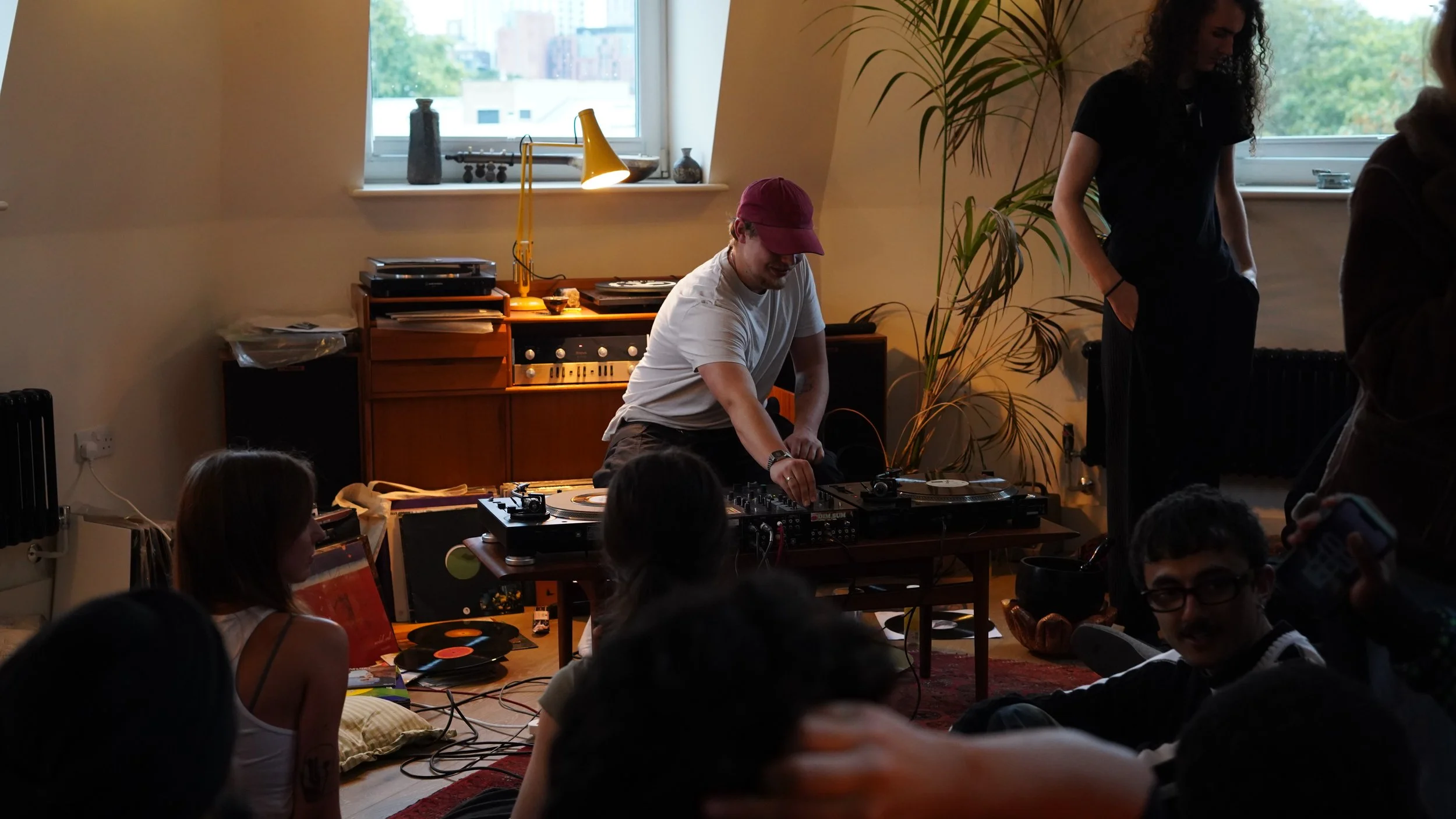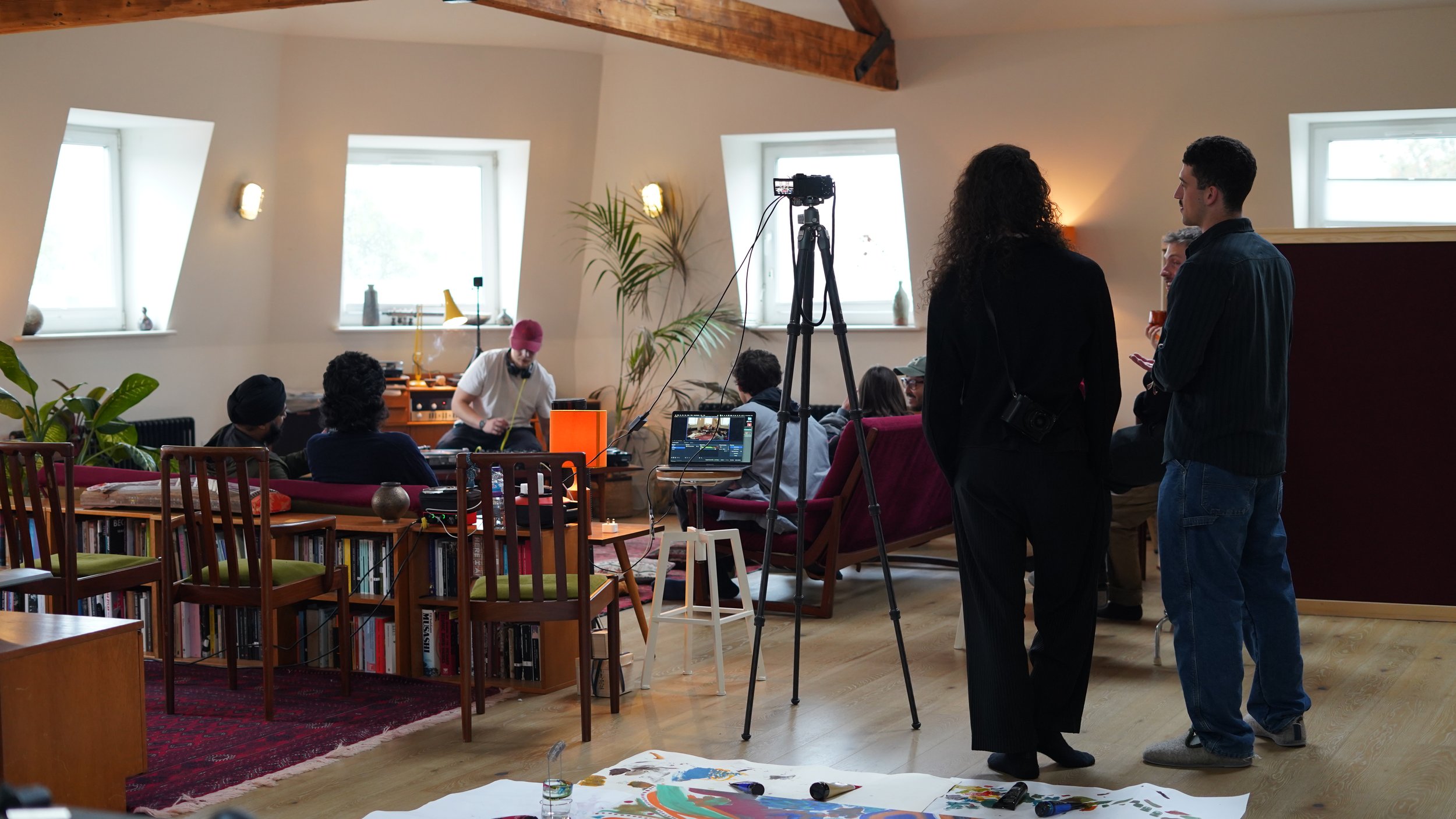Inside Onehand: A New Kind of Creative Space in London
Written by Elektra Kaldeli
Photography by Elektra Kaldeli
In a city as fast-paced and overstimulating as London, spaces that allow people to pause, listen, and connect are rare. Known as ‘third spaces’ - places that exist outside of work and home - they have become essential for fostering community and creativity in urban life. Onehand is such a space; a hub in East London where community and creativity meet. It combines the functionality of a recording studio with the openness of a cultural hub, offering artists and audiences alike the chance to gather, listen, and create without distraction. We experienced this first-hand when we attended one of their ‘Deep Listening’ events, an evening that reminded us of the value of slowing down, sitting with music, and being present with others.
Onehand was founded earlier this year by producers Brian Hingerty and Sol Cloney, who first met as students at Goldsmiths. What began as a friendship quickly developed into years of conversations about how the music industry might look if creativity and community were placed at its center. “Over the years we frequently daydreamed about starting a studio together that could change the way the music industry operated,” they recall.
After moving all of his recording equipment from Los Angeles to London, Brian joined forces with Sol to turn those daydreams into a reality. In April, they opened Onehand, designed not only as a fully functioning recording studio but also as a cultural hub for artists and audiences.
The environment is intentional: shelves of vinyl, photography books, and natural light sit alongside state-of-the-art equipment, blending the practical with the inspirational. “The idea was to create a space where art is at the front of its design and use,” they explain, “a functional home where an artist can feel totally welcome, safe, and inspired to create the best music they can.”
The deep listening sessions
Alongside its role as a studio, Onehand hosts monthly Deep Listening events. Each session invites DJs to play curated sets exclusively from vinyl, introducing audiences to music that may be unfamiliar or even impossible to find digitally.
The aim is simple: to create a space where listening is the focus, free from distraction. Attendees are encouraged to slow down and immerse themselves in music outside of the fast-paced, algorithm-driven digital world.
“The deep listening sessions are intended to be something that anyone can attend and enjoy,” they say. “Music is a universal language, so there should be no barriers. We hope people feel welcomed into the Onehand community and that this space belongs to them.”
When we attended a session, the atmosphere felt communal and unpretentious. Guests slipped off their shoes, picked out a mismatched mug for tea, and were shown around the space, setting a relaxed and welcoming tone. Conversations flowed easily between artists, creatives, and music lovers, and it quickly felt like a small community gathering. With Sol and Brian hosting, everyone felt genuinely included and at ease, making the evening as much about connection as it was about listening. During the tour, we learned that Onehand is not only a fully functioning recording studio, but also a home, and suddenly, the warmth of the space made perfect sense. For longer recording sessions, artists can even stay overnight in a cozy bedroom, allowing them to fully immerse themselves in the creative process.
As the deep listening session began, Kacper Pieta took his place behind the turntables, guiding the evening’s set. Between carefully chosen vinyl cuts, he shared stories about how he discovered each record, offering glimpses into the process of searching, digging, and collecting. His commentary gave the music a sense of history and context, adding another layer to the listening experience. The room was quiet and attentive, some people with their eyes closed, while others sat still, focused on every note and story he shared. For those who preferred to move around or keep their hands busy while listening, a large canvas on the floor offered another outlet. Paints and brushes were laid out for anyone to use, and over the course of the evening, the canvas slowly transformed, shaped by small touches and contributions.
In a landscape where music is so often consumed passively in the background, the event was a reminder of what it means to truly listen and engage with sound in a more intentional way.
Why vinyl matters
At the heart of these sessions is vinyl. “Vinyl DJs naturally gravitate toward interesting and rarely heard music,” Brian and Sol told us. “There’s also something about the physical element of watching someone cue up a record, as opposed to hitting a digital spacebar.”
Record collectors often spend hours searching for rare finds that never make it to digital platforms. This process of discovery, paired with the tactile act of playing records, creates a different kind of listening experience; one that resists the instant-skip culture of online streaming.
For Onehand, vinyl represents depth, patience, and curation. “It’s about reconnecting with the act of listening and celebrating music that deserves more than 15 seconds of attention,” they add.
A studio without boundaries
Onehand does not restrict itself to a single genre or style. They’ve welcomed artists from rising R&B names to experimental producers, often curating live bands for sessions to experiment with new arrangements. “We’re not genre-specific and love to experiment with different music styles done live,” they say.
Their approach reflects a commitment to keeping music organic and collaborative, moving away from industry trends that lean increasingly toward digital and AI-driven production.
Looking ahead
Although currently based in East London, Sol and Brian are already thinking far beyond it. Plans include developing a distribution label to support artists without diluting their vision, as well as expanding their events across London and internationally.
“Ideally Onehand becomes a household name associated with people’s favorite records,” they explain. “Anything with the name attached, we want people to assume it has artistic value.”
Their ambitions are clear: to create a cultural hub rooted in community, creativity, and respect for the art of listening. From Tokyo to Mexico City, their vision is for Onehand to be a platform that connects artists and audiences across borders, while staying true to the values that shaped the studio from the beginning: slowing down, listening deeply, and putting creativity first.










